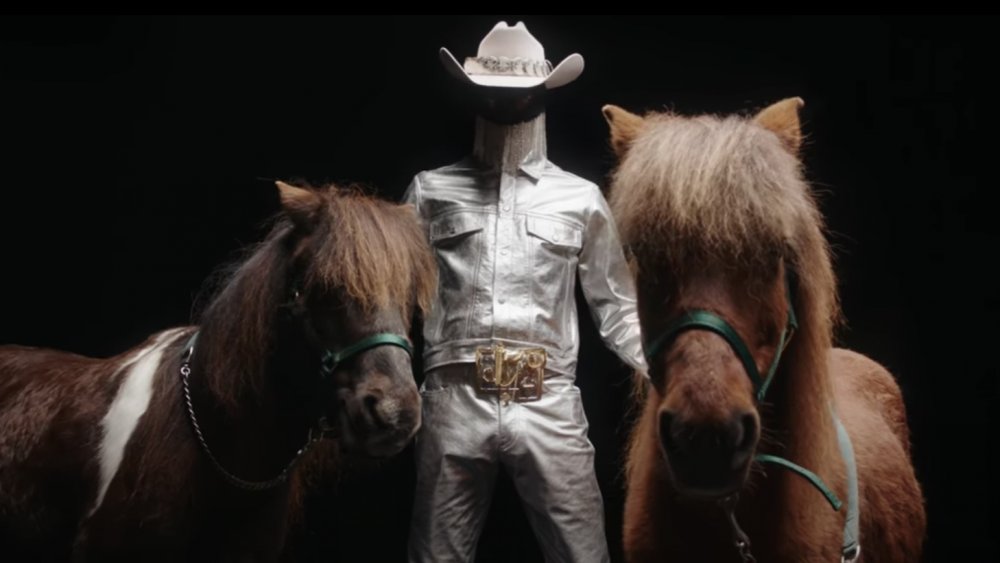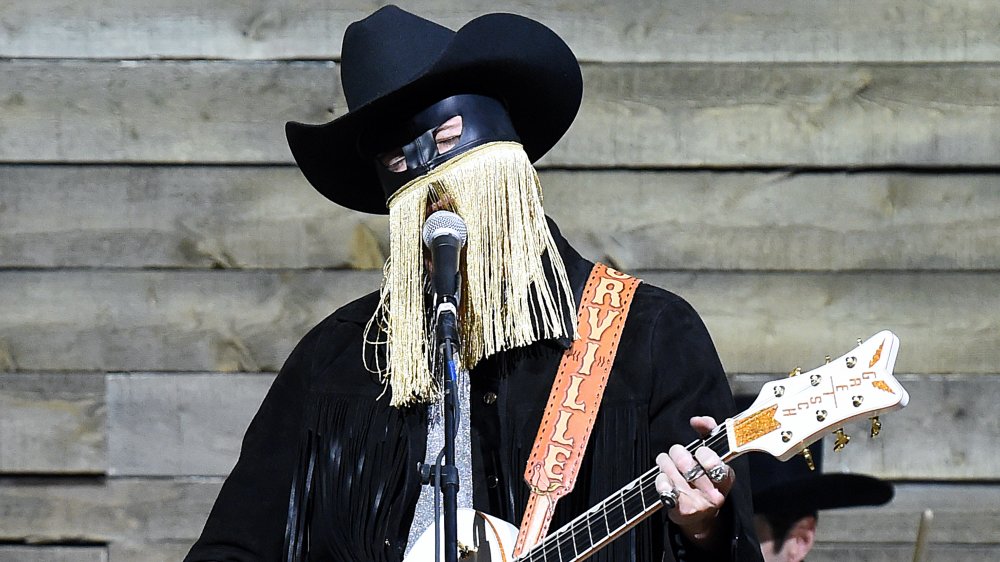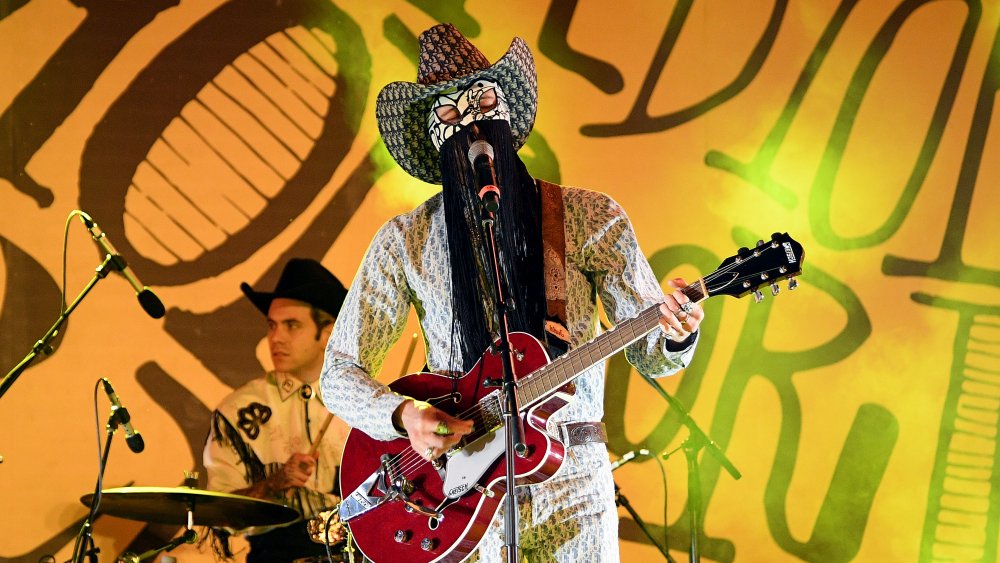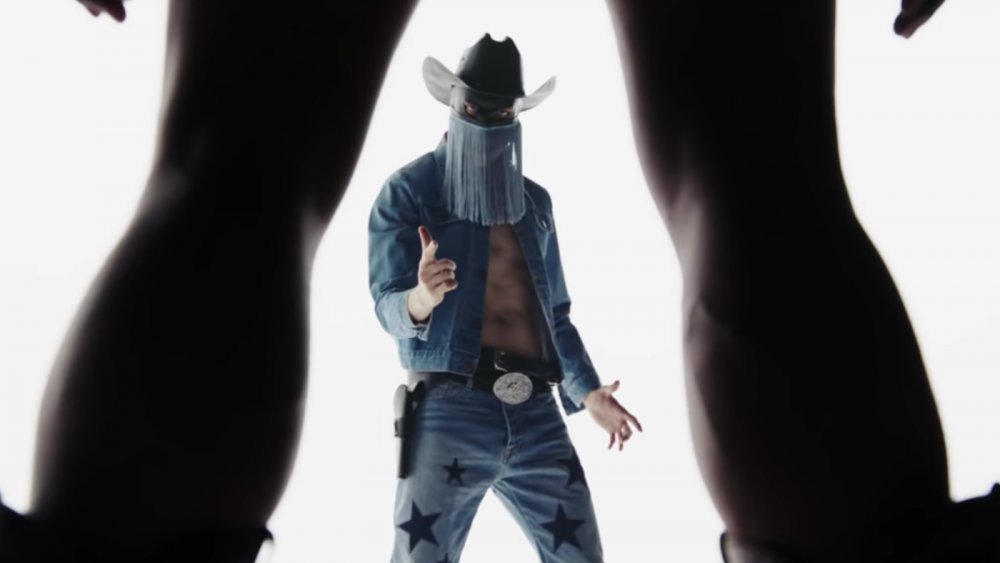The Untold Truth Of Orville Peck
To Vice, he's the "Lone Stranger." To Billboard, he's "the masked gay singer revitalizing country music." And to human ears, he's just a talented human being. He's Orville Peck, and since galloping onto the music scene, he's amassed admirers and inquirers. Much like his face, his background mostly remains shrouded in mystery, offering only brief and tantalizing glimpses like his mask's eyeholes, the peepholes to the soul. Whether or not you can see Peck's soul, you can definitely hear his soulful voice on his 2019 debut album, Pony.
Per NPR, people have likened Peck to Roy Orbison, Elvis Presley, and Chris Isaak. His haunting howls and longing lyrics in songs like "Dead of Night" and "Hope to Die" combine with surreal visuals in videos that would seem right at home on Mulholland Drive or Eraserhead. As Northern Transmission contributor Owen Maxwell writes, "One would be foolish to miss the hints of David Lynch in what Peck delivers on this record, as music can be dreamy but idiosyncratic like on 'Kansas,' but just as quickly descend into a kind of ugly chaos."
Indeed, when you enter the world of Orville Peck, you certainly won't feel like you're in Kansas anymore. But who is this masked crooner who has fans howling at the dark side of the moon?
The lonesome ranger
Whenever someone asks Orville Peck who he really is, via Billboard, he retorts, "All I know is I'm Orville Peck, and I'm a country star." Obviously, such mumness adds a layer of mystery to his trademark fringed mask, but Peck insists it isn't just a gimmick. As he put it, "I don't feel like I'm hiding behind a mask at all. It's actually quite the opposite — the mask and all of that has allowed me to be a lot more exposed." Speaking with Art and Seek, Peck said, "My first introduction to cowboys was seeing characters like the Lone Ranger, or these people that were, for whatever reason, on the outside of things, and kind of drifters and kind of had this lonely soul."
The singer also describes his own childhood as lonely, and as a boy he found masks and handkerchiefs comforting. Though he shies away from specifics, Peck told the Guardian he "grew up feeling pretty outcast and alienated." And in an interview for VMAn, he claimed to have lived in eight different countries during his life, the most recent being Canada. Did he spend his childhood moving about so often that he couldn't form lasting friendships? Perhaps, but one can only speculate.
Peck compares wearing his mask to Dolly Parton donning wigs or Johnny Cash wearing black. He sees it as part of the country tradition.
Parton me, Dolly: Peck's musical influences
In 2019, Orville Peck told Art and Seek that he became enamored of country at a young age. His first love in the genre was Dolly Parton, and as he got older he fell for the music of Merle Haggard, Waylon Jennings, and others. However, Peck has varied tastes in music. While he might always love Dolly Parton, he loves Whitney Houston even more, calling her his all-time favorite singer. He enjoys punk, soul, and classical music.
Per Billboard, Peck has even played in punk bands in the past, though he wouldn't name them. That might seem like a far cry from country, but he sees the genres as joined by a tradition of marginalized voices making themselves heard. His own music, meanwhile, is meant to share his experiences through song. In a strange way, he is simultaneously old and new, traditional and subversive. He sings about loving men, but they're just love songs in the end. He wears a mask just like everyone else. The only difference is that his mask is literal and somehow manages to bare his soul more deeply than a face attempting to look sincere.
Crying Lavender tears
In a sense, the seeds of Orville Peck's success were planted in 1973. That year, the band Lavender Country released a self-titled album — its only album — which is regarded as the first ever "proud-and-out country record," per the Guardian. Lavender Country featured a gay rights anthem: the unabashedly titled "Cryin' These C*cksucking Tears." Written by Patrick Haggerty, it opened with the line: "I'm fighting for when there won't be no straight men." The album mostly fell on deaf ears, but it struck a chord with members of the LGBTQ community. According to Billboard, it alse caught the ear of a 19-year-old Orville Peck.
In 2014, Haggerty commented on the progress of LGBTQ artists in country music. "Sure, we're still kicking down the closet door in Nashville," he said, "but I think we're on the cusp of something." He was right. 2019 would see the ascension of the openly gay Lil Nas X with his viral hit "Old Town Road." That same year, Orville Peck shared a stage with Lavender Country, which opened for his show. The Stranger reports that Peck described it as a dream come true.
On stage, Peck became both a performer and a fawning fan. Struggling to speak, he said to Haggerty, "Patrick, honestly, it's, this has been so, you are — the most — you're just so incredible." Maybe one day, someone inspired by Peck will say the same to him on stage.



